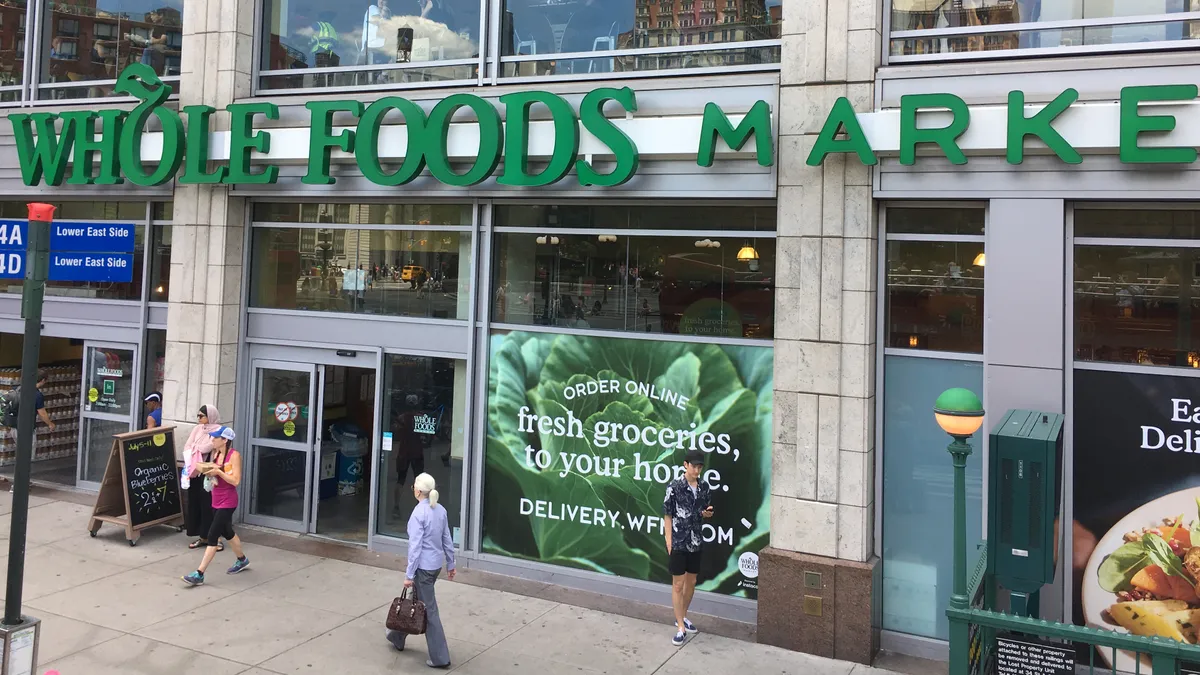Dive Brief:
- The Federal Trade Commission said Wednesday it would allow Amazon to continue with its $13.7 billion takeover of Whole Foods, according to the Associated Press.
- The agency said it had conducted an investigation to gauge whether the deal would decrease competition in the industry or unfairly conduct business, and ultimately decided not to pursue the matter further.
- Whole Foods shareholders also approved the retailer’s acquisition Wednesday.
Dive Insight:
The regulatory investigation into Amazon’s acquisition of Whole Foods has wrapped up quicker than many expected. Despite concerns voiced by lawmakers and by groups like the United Food and Commercial Workers International Union, the FTC completed its 30-day initial review into the deal without seeing the need to launch a deeper investigation.
Considering the miniscule market share Whole Foods and Amazon currently command in grocery, combined with the fact that the two companies are not direct competitors, it’s easy to see why the FTC came to such a swift conclusion. The two companies are responsible for less than 2% of grocery sales in the U.S., while Amazon’s current grocery footprint amounts to a few concept stores and a grocery delivery service that runs in just a handful of cities.
"When you combine the two, the question is whether it will substantially lessen competition or have an anticompetitive effect on the marketplace," Norm Armstrong, an antitrust lawyer at King & Spalding LLP and former deputy director of the FTC bureau that reviews mergers, told Bloomberg. "The answer is no."
The decision comes as a disappointment for those hoping the FTC would adopt a more progressive review process for mergers in the age of tech companies like Google and Facebook. Organizations like the UFCW, Food & Water Watch and others have expressed concerns that Amazon’s drive for efficiency and low prices would put smaller competitors out of business, jettison workers and create a culture that values large suppliers over the small ones Whole Foods has sold for so long.
Many agree Amazon’s entry into the brick-and-mortar grocery realm will change the industry for good. The company certainly has the potential to do so, given its history of disrupting retail — not to mention its immense resources, ingenuity and culture that encourages experimentation.
Still, Amazon’s industry dominance is by no means guaranteed. The company enters a very crowded grocery market full of top competitors. Recent months have seen grocers across the country ramp up their home delivery and click-and-collect services. Walmart and Kroger, the industry’s top players, have also shown a willingness to tinker with e-commerce fulfillment.
Amazon also faces the challenge of turning around Whole Foods’ fortunes. Analysts agree the e-tailer’s logistics and technology expertise will benefit the natural and organic grocer, which has struggled with outdated systems and declining comp store sales. Amazon also needs to bring down Whole Foods’ prices, but some argue this will be difficult given the retailer’s need to maintain margins and standards on many specialty brands. It’s also important to note that this is entirely new territory for Amazon. The e-commerce giant has never owned a physical retail chain before, and will need to hit the ground running as competitors throughout the industry look on.
Of course, Amazon’s lack of institutional knowledge could also be a key asset in disrupting the market. More will certainly be revealed in the coming months, right after the two companies finalize this deal once and for all.









